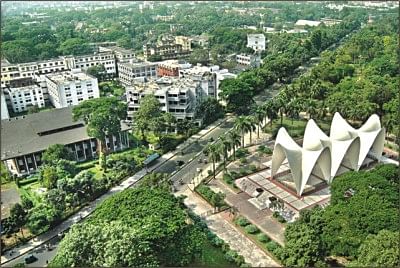High-rise, extension projects on without Rajuk's say

An aerial view of the Dhaka University campus dotted with 'self-planned' buildings.Photo: Syed Zakir Hossain
Dhaka University (DU) authorities continue to violate building laws, rules and codes in construction of buildings one after another without approval from Rajdhani Unnayan Kartripakkha (Rajuk) though they are required to obtain such approval.
They have recently undertaken projects to construct a number of high-rise buildings and reconstruction and extension of some existing ones without any approval from the government agency concerned.
The projects include a 12-storey building for Social Sciences faculty, a 10-storey Mathematics Building, vertical extension of a tall building in the Commerce Faculty and reconstruction of Fazlul Haq Hall's north block.
President of the Institute of Architects Bangladesh (IAB) Mubasshar Hussain said it gives a wrong message to the general public that laws are not equally applicable to all when authorities of the country's highest seat of learning defy laws of the land.
"This is not acceptable," said Hussain, who is also chairman-elect of Architects Regional Council Asia (Arch-Asia).
As per the Building Act of 1952, any building must be approved by an authorised officer or a designated building official, he said. "But it seems that the DU authorities violate the law exploiting their respectable image."
As per the Metropolitan Building Construction Rules of 2007, any organisation or individual within the Rajuk area (590 square kilometres) have to obtain building approval in compliance with the rules. As per the rules of 2006, repair and maintenance of any building too have to be approved by Rajuk.
The Building Construction Act of 1952 (amended in 1987) made it mandatory for any organisations to obtain building approval from an authorised officer. Only the armed forces are exempted for strategic reasons.
Anyone has to follow the law for any addition, alteration, modification and reconstruction of any building. Besides, any agency or individual has to follow the Bangladesh National Building Code (BNBC), a mandatory code for construction or renovation of any building.
Rajuk very recently issued a public notice in the mass media notifying all that any organisation or individual has to obtain land use clearance and approval of building design from Rajuk within its jurisdiction.
Vice-chancellor of Dhaka University Prof SMA Faiz said it has been a long practice that in many cases buildings on the Dhaka University campus have been constructed without formal approval from the government agency.
"We involve experts from Buet (Bangladesh University of Engineering and Technology) and the chief architect of Bangladesh in construction process of any building," he said.
"Rajuk has never opposed to building construction on our own," Prof Faiz said. "They have never come up with any objection either."
But replying to a question, the VC admitted that Rajuk served them a notice when they erected a pedestal on the rooftop of the DU central library building, an architectural masterpiece done by legendary architect Muzharul Islam, for installing a transmission tower of a mobile telephone company.
Dr M Shahidul Ameen, a professor of architecture at Buet and a member of DU's technical committee on building construction and repair, said that involvement of Buet experts does not mean that Dhaka University would not have to obtain building approval from the appropriate authorities.
"We just check the architectural plan of a building," he said.
He further said, "There is no denial that building without approval is a violation of law but the enforcing agency too have to take measures to make the law effective."
Chief Architect of Bangladesh ASM Ismail said it is not correct that DU does not have to obtain building approval if just the Department of Architecture is involved in layout planning of a building.
Prof Nazrul Islam, chairman of University Grants Commission (UGC), agreed that as per the law and rules, university authorities are required to obtain building approval from the authorities concerned.
He, however, suggested that exemption may be given for architectural and engineering design of a building only to those public organisations including Dhaka University that have full-fledged engineering wing.
"But they must strictly comply with the building construction rules and code (BNBC)," said Prof Islam, who is also honorary chairman of the Centre for Urban Studies and member of government's Urban Development Committee.
"They must also obtain planning (land use clearance) and height related approval from Rajuk," he said.
Chief Engineer of Rajuk Md Shah Alam said that as per the building act and rules of 2007, DU must obtain building approval.
Rajuk Secretary Md Faruque Jalil said DU authorities have to obtain approval from Rajuk as per the law, but they do not comply with that obligation.
There are government agencies and public organisations like LGRD and Dhaka City Corporation that do not bother about obtaining building approval from Rajuk.
"More than 90 percent buildings in Dhaka city have deviation, said Faruque Jalil. "But one cannot deny that Rajuk too has failures in enforcing building law because of manpower constraints."
The Town Improvement Act of 1953 too has delegated Rajuk with the authority to approve and oversee any building plan within its jurisdiction, said Rajuk sources, adding that any unauthorised building should be demolished as per building law.
Responding to legal obligation of obtaining building approval, DU Treasurer Prof Syed Abul Kalam Azad old Star City earlier that DU is much older than Rajuk. So, they do not need to obtain building approval from Rajuk.
Prof SMA Faiz said they need to expand the physical infrastructure of the university to accommodate the staggering number of around 32,000 students. So they had to hurriedly undertake different construction and development work.
He said that the original 600 acres area of DU has shrunk to 255 acres (252.70 acres + recently obtained 2.29 acres) with the Suhrawardy Udyan, Bangla Academy, Atomic Energy Commission, Attorney General's Office, National Museum, and some other establishments occupying a great chunk of DU area.

 For all latest news, follow The Daily Star's Google News channel.
For all latest news, follow The Daily Star's Google News channel. 



Comments